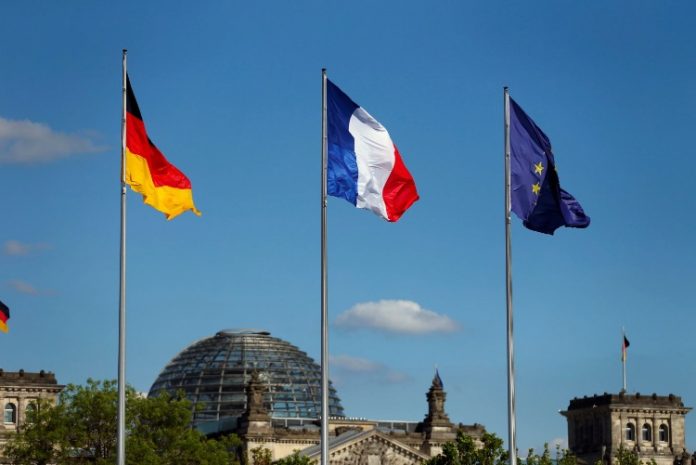For decades, the EU had a predictable political dynamic: whether it consisted of 6, 12 or 27 countries, member states always sought to find compromises until whatever was stitched together by France and Germany was accepted by all. However, the old model of dominance by the two largest members has long been failing. As Europe faces recurrent crises, a new, more fluid geography of power is emerging, The Economist reports.
Three years of pandemics and the war in Ukraine have been reasons to rethink the European project. This includes a rebalancing of importance. Defence and eastward enlargement, once dormant policy areas, are now priorities, giving a new voice to Ukraine’s neighbours in Central Europe. China’s growing influence and the prospect of a resurgence of Trumpism in America have forced the EU to rethink its economic arrangements – often in line with French policy. Climate imperatives have reinforced the value of taking action at a collective level – an approach favoured by the EU’s quasi-federal institutions in Brussels. From Finland to France, far-right populists are gaining influence in the run-up to the European Parliament elections in June.
A few years ago, Angela Merkel was the undisputed leader of the EU. Her successor as German Chancellor, Olaf Scholz, was unable to hold on to that status. Many, not least the French president himself, expected it to go to Emmanuel Macron. But he faces an increasingly difficult political situation at home, leading him to sack his prime minister on 8 January in the hope of a reset. He may not run for re-election in 2027, and he exudes an assertiveness that often irritates his fellow EU leaders. Germany and France have unrivalled credibility when they are united. However, this is rarely the case.
In the absence of clear leadership, who matters these days depends on what is at stake. Take defence and security, for example – issues that are at the forefront of everyone’s attention given the situation in Ukraine (and more recently in the Middle East). Since the outbreak of war in Ukraine in February 2022, few people have paid much attention to Germany: it allowed itself to be sucked up by Russian gas, and its armed forces were so unsuitable that Mr Scholz declared the need for a Zeitenwende, that is, a change in the spirit of the times. By contrast, the Central European countries, led by Poland and the three Baltic states, felt vindicated after years of warnings of danger, according to The Economist.
Their influence has manifested itself in two policy changes. The first is the EU itself paying for arms supplies to Ukraine, which was the first step towards increasing defence spending. The second is EU enlargement, which was not previously on the agenda; no country has joined since Croatia in 2013. Nine candidates are now in various stages of negotiations. The most prominent is Ukraine, favoured by Central Europe despite initial reservations from France and Denmark; EU leaders agreed on 14 December to begin formal accession talks. When the bloc expands to 36 countries – which will take years if not decades – the centre of gravity will shift eastward.
In a broader sense, Central Europe now has enough strength to resist ideas coming from the more distant West. Chief among these is “strategic autonomy,” a concept promoted by French President Macron. According to this concept, Europe should be able to act independently of others, for example by bearing more of the burden of defending itself. Politicians in Poland or Slovakia find the security guarantees provided by NATO and, by extension, America, much more convincing. French calls for EU armed forces to buy European (i.e. often French) military kits have been largely ignored, The Economist reports.
For all the influence Central Europe has over Ukraine, however, its voice is barely heard when it comes to other elements of European policy. (The moral authority Warsaw and Bratislava had built up by helping Ukraine was somewhat eroded after they closed their borders to agricultural exports last April, angering Ukrainian leaders.) When it comes to economic policy, Europe is being forced to think increasingly in French terms. Mr Macron’s call for strategic autonomy, on the other hand, has proved far more impactful. France wants the continent to be more self-sufficient, driven by a long-standing distrust of globalisation and new fears about supply chains that could be disrupted by pandemics or volatile geopolitics. Tensions between America and China, as well as the prospect of a new Trump administration taking office in 2025, have made other Europeans take heed.
France’s dirigiste impulses prevailed because its ideas filled the vacuum left by Britain, which voted to leave the EU in 2016 and finally withdrew four years later. Had she remained a member, she would have enthusiastically wrecked French plans. That task now falls to its former northern European allies, such as Denmark, Ireland or the Netherlands, and to a commission in Brussels.
Britain is not the only absentee from the EU’s top table. A more surprising absentee is Germany: Mr Scholz is seen as inactive on the European stage. A complex coalition including left-wing Greens and free-market liberals limits his deal-making power in Brussels. “The German coalition is moving slower than the debate within the EU,” says a senior Brussels official. That has cost it influence.”
Germany’s absence often turns to France’s advantage. Many EU policy decisions these days have a distinctly French flavour, such as the absence of major new trade deals (which French farmers don’t like) or the partial relaxation of European rules limiting budget deficits. But mostly the lack of German involvement is hampering Mr Macron’s ambitions: the federalist schemes hatched in Paris are only truly realised when colleagues in Berlin join in.
